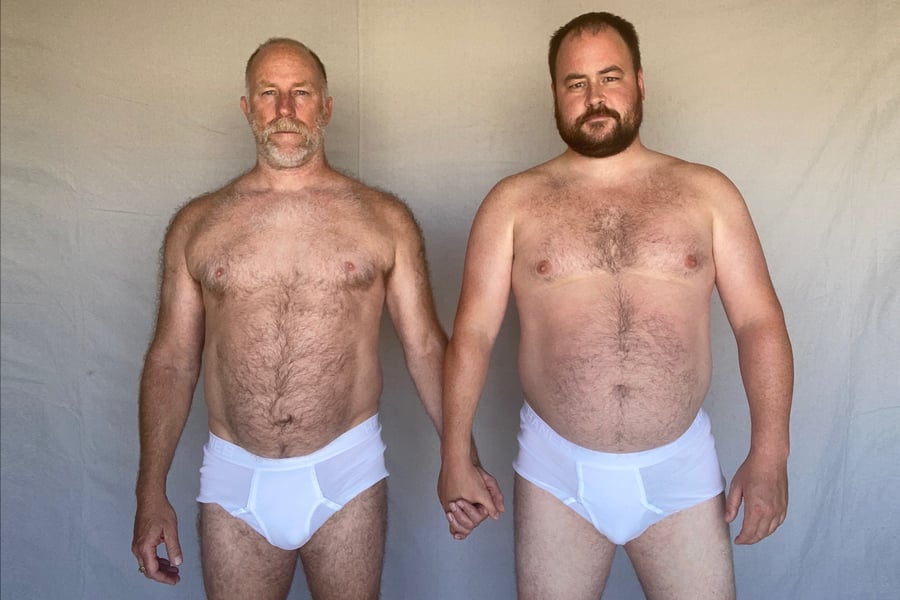Last week, Man On Man, a new rock duo created by Faith No More keyboardist Roddy Bottum and his musical partner and boyfriend, Joey Holman, released the video for their first single “Daddy.” The clip, which featured Bottum and Holman embracing in their tighty-whities, sharing a banana Lady and the Tramp-style, and seductively pulling on each other’s underwear, was not without its sexual overtones but featured no nudity and paled in comparison to some of YouTube’s more overtly sexual videos by A-list artists.
“The statement of the song and video for ‘Daddy’ maybe is a celebration of love in isolation and is a love letter to the not-so-distant past of a place and time where we communed physically together with our queer community,” Bottum told Rolling Stone last week.
Content managers at YouTube thought otherwise. In a message to the group shortly after the clip’s release, an employee for the platform said it removed the video for violating “our sex and nudity policy.”
“It’s important to us that YouTube is a safe place for all,” the note, obtained by Rolling Stone, read. “If content breaks our rules, we remove it. Graphic sexual content that is meant to be sexually gratifying is not allowed on YouTube. Because it’s the first time, this is just a warning. If it happens again, your channel will get a strike and you won’t be able to do things like upload, post, or live stream for one week.” The company added the group was welcome to appeal the decision via an online form.
Following a request for comment by Rolling Stone, a rep for the company said the platform made a mistake and reinstated the clip. “With the massive volume of videos on our site, sometimes we make the wrong call,” the rep tells Rolling Stone. “When it’s brought to our attention that a video has been removed mistakenly, we act quickly to reinstate it. We also offer uploaders the ability to appeal removals and we will re-review the content.”
While Man on Man were happy to see their video back on the platform — the band had uploaded it to Vimeo as a substitute in the interim — they assailed YouTube for its original decision, which they claim is arbitrary and discriminatory.
“It’s clear tech companies are lacking in representation and therefore discriminate against skin color, age, sex, and sexuality,” the group tells Rolling Stone. “Even if YouTube does value and promote diversity, the truth is, the industry is still playing by straight men’s rules. It’s devaluing when we see Google monopolize on our Pride but do so little to actually enhance and protect the LGBTQIA+ digital experience. We’re asking for an equitable playing field.”
Love Music?
Get your daily dose of everything happening in Australian/New Zealand music and globally.
Last year, the platform unveiled three documentaries for Pride month focusing on the LGBTQ+ experience, including State of Pride, a feature doc on the significance of gay pride that included interviews with various leaders of the movement. While the company took steps to highlight Pride month such as changing its social-media-account avatars to a rainbow, it received widespread criticism after LGBTQ blogger Carlos Meza criticized the company for not acting on homophobic threats levied at him by a right-wing commentator.
“Our teams spent the last few days conducting an in-depth review of the videos flagged to us, and while we found language that was clearly hurtful, the videos as posted don’t violate our policies,” the company said at the time. “As an open platform, it’s crucial for us to allow everyone — from creators to journalists to late-night TV hosts — to express their opinions within the scope of our policies. Opinions can be deeply offensive, but if they don’t violate our policies, they’ll remain on our site. Even if a video remains on our site, it doesn’t mean we endorse/support that viewpoint.”
Following criticism, the company apologized at the end of Pride month last year in an open letter to creators. “We’re proud of the incredible LGBTQ voices on our platform and the important role you play in the lives of young people. But we’ve also had issues where we let the LGBTQ community down — inappropriate ads and concerns about how we’re enforcing our monetization policy. We’re sorry and we want to do better,” the company wrote.
“We’ve taken action on the ads that violate our policies, and we are tightening our enforcement,” it added. “And when we hear concerns about how we’re implementing our monetization policy, we take them seriously and make improvements if needed. It’s critical to us that the LGBTQ community feels safe, welcome, equal, and supported on YouTube. Your work is incredibly powerful and we are committed to working with you to get this right.”
“There’s enough representation in the gay community of young, hairless pretty men,” Bottum told Rolling Stone last week. “It feels good to represent a faction of our culture that isn’t squeaky and manicured. Based on the ageist and homophobic responses posted in the comments section of a straight publication that ran our photo, I’m happy to be those faces on the queer map.”



































